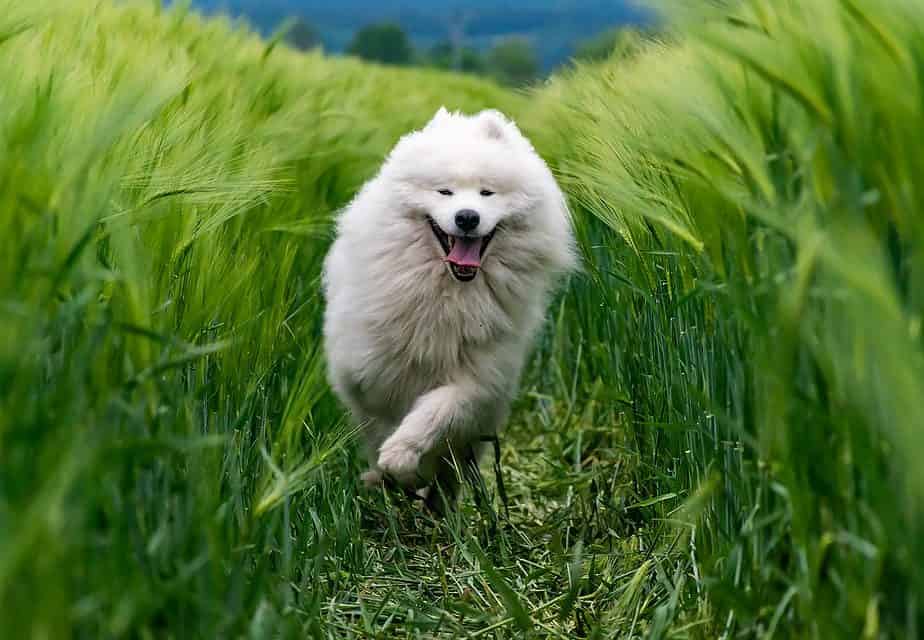
Samoyeds are great dogs for active, outgoing individuals and families but are they good pets for novice pet owners?
Samoyeds are not for beginner dog owners due to these dogs’ high maintenance and training needs. Samoyeds have strong instincts, so training them can be challenging. The habit of barking can be hard to break but, on the other hand, a typical Samoyed is friendly toward other pets and people.
POTENTIAL CHALLENGES WITH SAMOYEDS AS PETS
Samoyeds Can Be Hard to Train
Per Stanley Coren, a well-known canine psychologist, Samoyeds have above-average working intelligence. These dogs’ problem-solving skills are excellent. However, these pups are very stubborn due to strong instincts, which makes them difficult to train, despite their intelligence.
Here are some points on training a Samoyed:
- Dogs with above-average working intelligence need consistency when learning a new skill.
- Samoyeds retain new skills and commands well but benefit from the repetition of skills.
- Poor skills of the trainer can affect the dog’s learning. You don’t need a professional trainer but you need to be patient and organized and avoid punishing your pet.
- Like most dogs, Sammies respond to positive reinforcement, such as verbal praise or treats, and do not respond well to impatience or punishment.
- They could get distracted outdoors or in an unfamiliar environment and might not follow your commands as well as at home.
- Keep the training sessions short and train when the dog is receptive and able to focus.
- Avoid training when a lot is happening around you. Train in a quiet area to improve the dog’s focus.
- Practice commands in different settings.
Strong instincts are a major challenge for a Samoyed. These dogs are wired for some behaviors, including barking and chasing. Those habits are usually hard to unlearn.
Spitz dogs in general, and Samoyeds, in particular, are also very independent, and free-spirited. They like to please the owner but have strong personalities.
Samoyeds Bark And Their Voices Are Loud
Samoyed dogs are known for their shrill voices and being vocal in general. It is just how they communicate with the world around them.
This behavior is instinctive, which is why teaching your Samoyed to suppress the urge to bark might be a challenge.
Samoyeds Like to Chase
Another issue – especially problematic if you have young children or small pets at home – is that Samoyeds love to chase, track, and, possibly, even nip at ankles.
These dogs are patient and sweet with kids, but you would need to do some preparation for a Samoyed and a child to live comfortably in the same household.
There are ways to train and discourage dogs from chasing but, again, this behavior is instinctive and the instinct is strong.
You might also need to be vigilant outdoors and watch how your Samoyed reacts to runners, bikers, and people in general. Chasing cats, squirrels and other small animals can also be an issue.
Until you know that you can trust your pet, keep your dog on a close leash to avoid misunderstandings.
Samoyeds Are Relatively High-Maintenance
Samoyeds can be high-maintenance, time-consuming pets.
A bright and active Sammy needs walks and games to keep his or her mind engaged and release energy.
In addition, these pups need regular brushing and occasional baths to maintain their beautiful fur.
Your home needs a good vacuum cleaner and lint rollers because these dogs shed a lot, especially in spring and autumn. On the positive side, brushing could become a fun and bonding activity for school-age children. Many dog owners find brushing their dogs very therapeutic and most dogs also enjoy being brushed.
POSITIVES OF HAVING A SAMOYED AS A PET
Samoyeds Are Amazing Activity Buddies
If you are outdoorsy and active, a Samoyed can be a fabulous companion for hiking, running, camping, and doing things outside in general.
These dogs are friendly and energetic, so a Samoyed will probably have plenty of enthusiasm for most activities and this solves the problem of their excessive energy to spare!
Remember that Samoyeds are a heat-sensitive breed, so take precautions to protect your dog from heatstroke in the summer months.
If you are a swimmer, your pet may not like to accompany you while swimming in a lake. Many Samoyeds are cautious around water and need time to get used to being in the water.
Samoyeds Are Friendly, Sociable Dogs
Despite some of the challenges with training these dogs, Samoyeds are neither aggressive nor prone to reacting in ways that can be perceived as threatening.
Like dogs of any breed, a Samoyed needs to be properly socialized and exposed to training as early as possible.
Most Samoyeds do exceptionally well with neighbors, visitors to their owner’s home, or even strangers they encounter in the streets.
Samoyeds Can Live Peacefully With Most Friendly Pets
With proper training and socialization, Samoyeds adapt well to any household, including families with other pets in the home.
Their urge to chase could be an issue for families with small animals, including cats and rodents, so provide a safe space for the smaller pet if needed until your Samoyed is appropriately trained.
To Conclude
A Samoyed could be a great dog for a novice dog owner who is prepared for potential challenges and is ready to provide the dog with ample time and attention. Ideally, however, these dogs are a better match for people who are experienced with dogs.
Related Questions:
Are Samoyeds Good With Young Children?
Samoyeds are amazing dogs for active kids of school age but some behaviors can be problematic around younger kids. In particular, many Samoyeds have the urge to chase and bark. These pups are friendly and patient but need plenty of supervision around toddlers and preschool-age kids. Training a Samoyed requires skills and consistency.
Recent Posts
Guinea pigs have excellent hearing, especially at high frequencies. They are more sensitive to high-pitched sounds than people. These pets should not be exposed to sounds loud enough that you would...
Guppy fish Dwarf gourami Choosing the right tank mates is so important for a peaceful community aquarium. Can guppies and dwarf gouramis live in one tank? Dwarf gourami and guppies can live...

